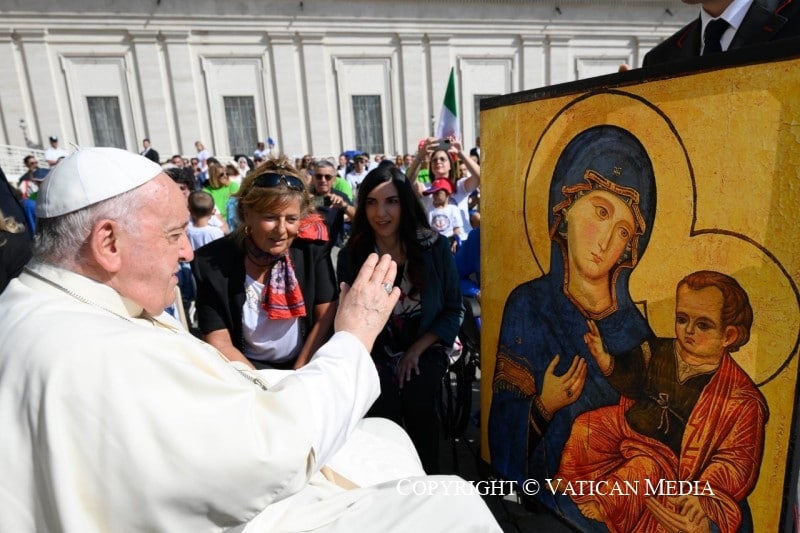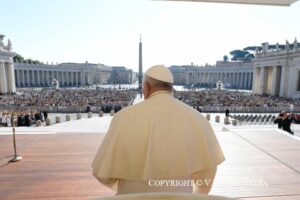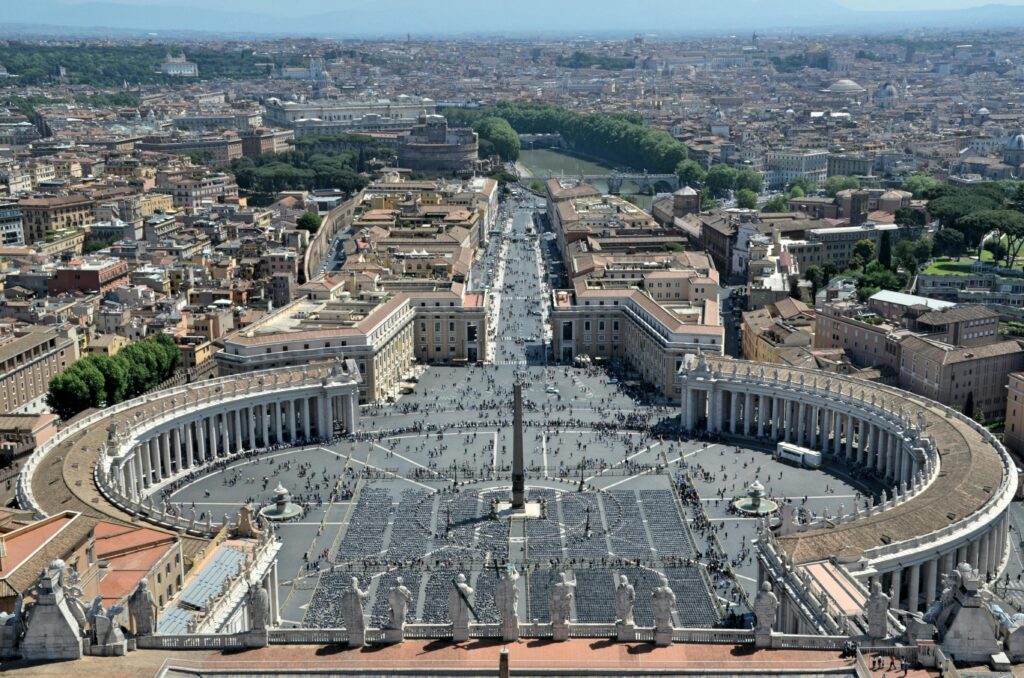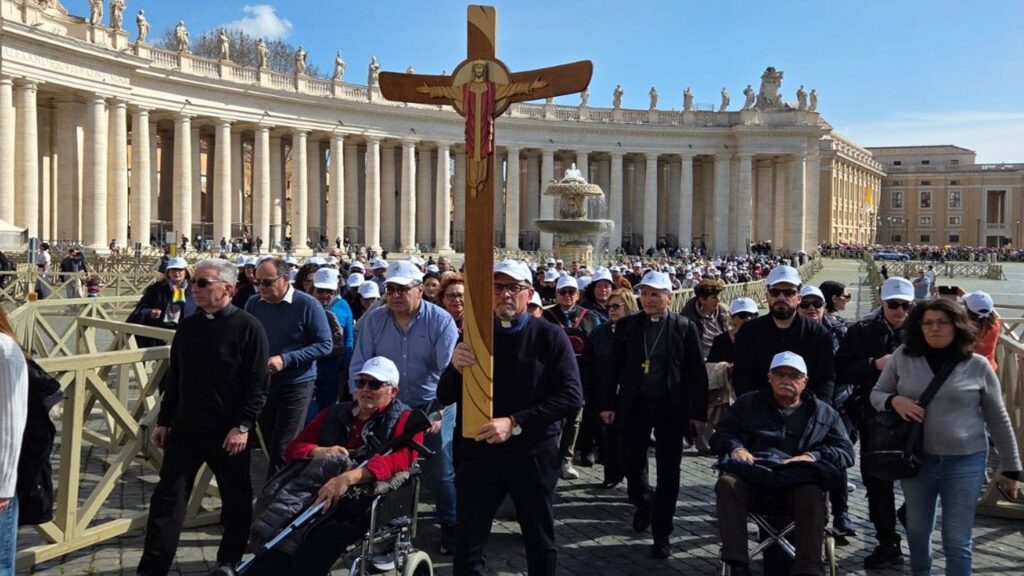Pope Francis: “Called to widen the boundaries of our gaze”
General Audience: Catechesis. The Journey to Mongolia

This morning’s General Audience was held at 9:00 a.m. in St. Peter’s Square.
In his address in Italian, the Pope focused his meditation on his recent Apostolic Journey to Mongolia.
After summarizing his catechesis in the different languages, the Holy Father addressed unique greeting expressions to the faithful present.
The General Audience concluded by reciting the Pater Noster and the Apostolic Blessing.
Catechesis of the Holy Father
Catechesis. The Journey in Mongolia
Dear brothers and sisters, good morning!
On Monday I returned from Mongolia. I would like to express my appreciation to those who accompanied me on my visit with prayer, and to reiterate my gratitude to the authorities, who solemnly welcomed me: in particular Mr. President Khürelsükh, and also the former President Enkhbayer, who gave me the official invitation to visit the country. I think back with joy of the local Church and the Mongolian people: a noble and wise people, who showed me great warmth and affection. Today I would like to take you to the heart of this journey.
One might ask: why did the Pope go so far to visit a small flock of the faithful? Because it is precisely there, far from the spotlight, that we often find the signs of the presence of God, who does not look at appearances, but at the heart, as we have heard in the passage from the prophet Samuel (cf. 1 Sam 16:7). The Lord does not look for the centre-stage, but the simple heart of those who desire him and love him without ostentation, without wanting to tower above others. And I had the grade of meeting, in Mongolia, a humble Church, and a joyful Church, which is in the heart of God, and I can testify to their joy of finding themselves also at the centre of the Church for a few days.
That community has a touching history. It came about, by the grace of God, from the apostolic zeal – on which we are reflecting at the moment – of a few missionaries who, impassioned by the Gospel, went about thirty years ago to that country they did not know. They learned the language – which is not easy – and, despite coming from different nations, gave life to a united and truly Catholic community. Indeed, this is the meaning of the word “catholic”, which means “universal”. But it is not a universality that homogenizes, but rather a universality that inculturates, it is a universality that is inculturated. This is catholicity: an embodied universality, “inculturate”, which embraces the good where it is found and serves the people with whom it lives. This is how the Church lives: bearing witness to the love of Jesus meekly, with life before words, happy with its true riches: service to the Lord and to brethren.
This is how that young Church was born: in the spirit of charity, which is the best witness of faith. At the end of my visit, I had the joy of blessing and opening the “House of Mercy”, the first charitable work that to be established in Mongolia as an expression of all the components of the local Church. A house that is the calling card of those Christians, but that asks every one of our communities to be a house of mercy: that is, an open place, a welcoming place, where the sufferings of each person can enter without shame in contact with God’s mercy, that lifts up and heals. This is the witness of the Mongolian Church, with missionaries from various countries who feel at one with the people, happy to serve them and to discover the beauty already there. Because these missionaries did not go to proselytize; this is not evangelical. They went to live there like the Mongolian people, to speak their language, the language of that people, to take on the values of that people and to preach the Gospel in the Mongolian style, with Mongolian words. They went and they were “inculturated”: they took on the Mongolian culture to proclaim the Gospel in that culture.
I was able to discover something of this beauty, also by meeting some people, listening to their stories, appreciating their religious quest. In this regard, I am grateful for last Sunday’s interreligious and ecumenical meeting. Mongolia has a great Buddhist tradition, with many people who live their religiosity in a sincere and radical way, in silence, through altruism and mastery of their own passions. Just think of how many hidden seeds of goodness make the garden of the world flourish, while we usually only hear about the sound of falling trees! And this is a… people, we too, like scandal: “But look what barbarism, a tree has fallen, what a noise it made!” “But do you not see the forest that grows every day?”, because growth is silent. It is decisive to be able to discern and recognize the good. Often, however, we appreciate others only to the extent that they correspond to our ideas; and we must see this good. And this is why it is therefore important to turn our gaze upwards, towards the light of goodness. Only in this way, starting from the recognition of the good, can we build a common future; only by valuing others can we help them to improve.
I was in the heart of Asia, and this did me good. It is good to enter into dialogue with that vast continent, to glean its messages, to know its wisdom, its way of looking at things, to embrace time and space. It was good for me to meet the Mongolian people, who cherish their roots and traditions, who respect the elderly and live in harmony with the environment: they are a people who contemplate the sky and feel the breath of creation. Thinking of the boundless and silent expanses of Mongolia, let us be stirred by the need to extend the confines of our gaze, please: broaden the horizons, look high and low, look and do not fall prisoner to trivial things. Let us expand the boundaries of our gaze, so that we may be able to see the good in others and be capable of broadening our horizons, and let us also open our heart; we need to make our heart grow and expand, in order to understand, to be close to every person and every civilization. Thank you.
____________________________________
 Special Greetings
Special Greetings
I extend a warm welcome to the English-speaking pilgrims and visitors taking part in today’s Audience, especially the groups from Malta, Senegal, Australia, Indonesia and the United States of America. Upon you and your families I invoke the joy and peace of our Lord Jesus Christ. God bless you all!
I would like to add that, with great sorrow I have learned of the fire that broke out in a five-storey building in the centre of Johannesburg, South Africa, killing more than seventy people, including a number of children. I ask you to join me in praying for the unfortunate victims. To their families I express my deep condolences, and I send a special Blessing to them and to all those working to provide assistance and support.
__________________________________________
Summary of the Holy Father’s words
Dear brothers and sisters: In my recent Apostolic Journey to Mongolia, I encountered a young Church filled with apostolic zeal in the midst of a great and noble Asian people. Because God so often makes his presence known in small and quiet ways, I was pleased that, for a few days, Mongolia’s Catholic community, founded by missionaries just thirty years ago, was at the centre of the Church’s attention. The Church’s catholicity, her call to incarnate the Gospel in all peoples and cultures, inspires her to testify to her faith through words of charity. In Ulanbaatar, I blessed “the House of Mercy”, the first large charitable work undertaken by the local Church. In a country with a great Buddist tradition, I acknowledged the quiet cultivation of goodness by so many of its followers, and in my meeting with religious leaders I encouraged the growth of dialogue, mutual understanding and fraternity. As I give thanks for those days spent in the heart of Asia, beneath the vastness of God’s sky, I pray that all peoples will grow in wisdom, respect for diversity and commitment to working together in building a shared future for our world.
Related

Holy Week 2025 at the Vatican: Calendar. Faith, Tradition, and a Long-Awaited Canonization
Exaudi Staff
02 April, 2025
1 min

Young Catholic Entrepreneurs: Stories of Faith, Courage, and Business Success
Javier Ferrer García
02 April, 2025
4 min

Echoes of the Jubilee of the Missionaries of Mercy
José María Montiu de Nuix
02 April, 2025
4 min

Pope Francis and Hope: Reflection on Jesus’ Encounter with Zacchaeus
Exaudi Staff
02 April, 2025
2 min
 (EN)
(EN)
 (ES)
(ES)
 (IT)
(IT)

